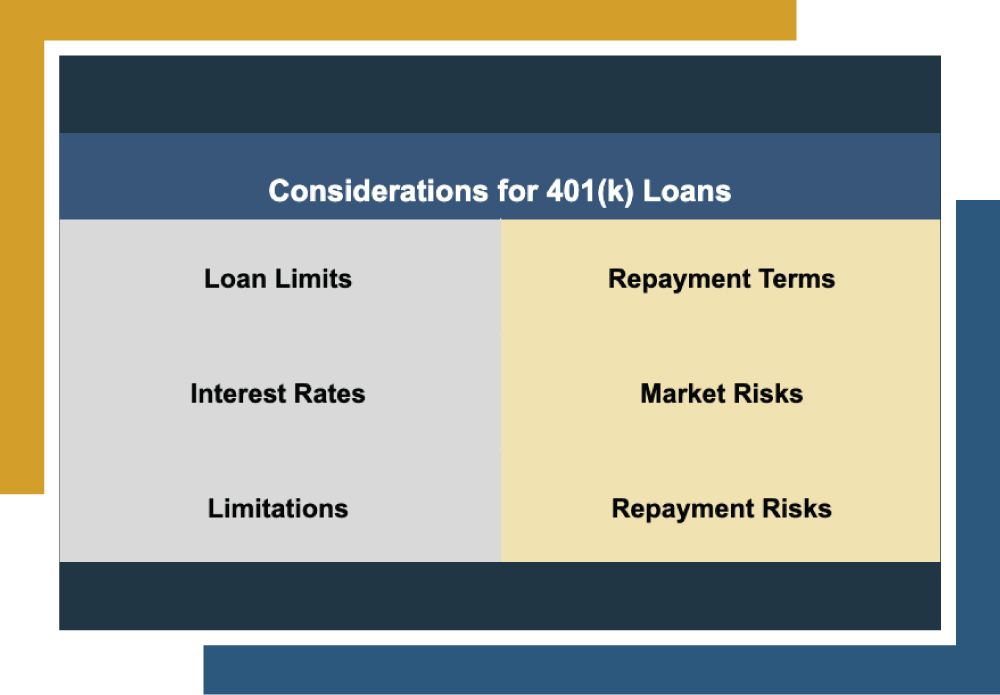Investors continually seek to diversify their portfolios and enhance returns, often exploring new investment avenues. One intriguing option is using a 401(k) loan for real estate investment.
Typically, 401(k) accounts offer limited control over specific investments, prompting some investors to consider leveraging these funds for alternative investments like real estate. A 401(k) loan can be an attractive strategy for those with substantial savings.
This guide will examine the complexities, benefits, risks, and regulatory constraints associated with using a 401(k) loan for real estate investment.
| Discussion Topics |
Can I Use a 401(k) Loan for Real Estate Investment?
You’ll be happy to know that you can absolutely use a 401(k) loan for real estate investment.
Typically, you cannot use the funds directly from a 401(k) for real estate investment. However, using a 401(k) loan leverages your equity instead of using the funds directly.
Using a 401(k) Loan for Real Estate Investment | |
| Check your 401(k) plan or contact the administrator to see if loans are allowed or if any conditions or restrictions exist. Then verify the maximum loan amount, usually the lesser of $50,000 or 50% of your vested balance. |
| Assess your liquidity, debts, and cash flow to ensure that you can handle repayments. Then, define your real estate objectives, such as long-term appreciation or rental income. |
| Research potential markets and properties, considering location, trends, and market conditions. Evaluate market volatility and management challenges and account for unexpected expenses. |
| Apply according to your plan’s process. This includes filling out forms and providing any necessary documentation. Once approved, funds will be transferred to your bank account. |
| Use the loan proceeds to purchase the property, covering all legal and financial aspects. |
| Establish a structured repayment plan and regularly review your repayment strategy as needed. |
| Manage and maintain the property, including tenant management. Periodically assess the property’s performance and adjust strategy as needed. |
Fundamentals of a 401(k) Loan for Real Estate
- Loan Limits: Typically, the maximum loan amount is the lesser of $50,000 or 50% of the vested account balance.
- Repayment Terms: Standard repayment terms for investment real estate typically extend up to five years.
- Interest Rates: Interest rates are typically set at the prime rate plus 1-2%, and repayments are made through payroll deductions.
Legal and Regulatory Considerations
Before taking a loan out against your 401(k), it is crucial to understand the regulatory caveats associated with doing so.
- ERISA Compliance: The Employee Retirement Income Security Act (ERISA) establishes the guidelines for most voluntarily established retirement and health plans. Ensuring that your 401(k) plan permits loans and that any loan taken adheres to ERISA regulations is essential.
- Plan-Specific Rules: Every 401(k) plan comes with its own set of rules and restrictions regarding loans. Carefully review your plan’s documents to understand the permissible uses of loan proceeds and any specific requirements or limitations.
Risks and Challenges
While leveraging your 401(k) with a loan can enhance your buying power for real estate investments, there are several potential risks and downsides to consider.
- Limitations: You can borrow from your 401(k) up to the lesser of $50,000 or 50% of your vested balance. This amount is often insufficient to purchase investment real estate outright, so it should be seen as a means to augment your purchasing power rather than as the sole funding source.
- Market Risks: Real estate investments carry inherent risks, including market volatility, property depreciation, and unforeseen expenses. Like any investment, real estate can perform poorly, leading to potential financial losses.
- Repayment Risks: If you lose your job, your 401(k) loan typically becomes due soon. Failure to repay the loan will result in the outstanding balance being treated as a taxable distribution, which may incur a 10% early withdrawal penalty if you are under 59½.
Exploring Other Options
While investing in real estate with a 401(k) loan may not afford enough to purchase investment real estate, and there are specific caveats, there are other paths. You can also use a particular kind of 401(k) called a self-directed 401(k) to invest in real estate, and we can help get you started.
Partnering with CVC to Invest with Your 401(k)
At Canyon View Capital, we manage a diverse multifamily real estate portfolio valued at over $1 billion across the Midsouth and Midwest. We invite accredited investors to partner with us and benefit from our extensive experience and expertise.
With Canyon View Capital, you can enjoy passive real estate income without the headaches of property management. Our approach also offers numerous potential tax benefits, making your investment journey smoother and more rewarding.
Need more information on using a 401(k) loan for real estate investment?
We’re happy to help! Call CVC today to learn more. Get Started
Eric Fisher, Chief of Staff
Eric joined Canyon View Capital in August 2021 with 15 years of hotel management experience grounded evenly between Property & Corporate Operations, and Business Development & Acquisitions. After $500M+ in hotel acquisitions, Eric uses his nuanced understanding of the acquisitions and transitions processes to support CVC real estate investments. His professional versatility makes Eric an invaluable resource for the President and Executive Team in all business functions, including Investments, Operations, and Strategy.


